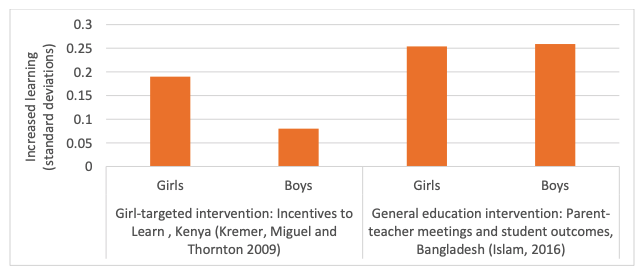How did you mark International Women’s Day this month? Did you bemoan outrageous stats about gender inequality? Did you celebrate recent gender policy wins? Or the impressive progress on girls’ education that we’ve seen over the last 50 years? Maybe you said thank you to the important women who have shaped your own life. At Echidna Giving, we are grateful for the incredible work all of you do to dampen inequality and fight for more wins for girls’ education. We got to savor our gratitude while watching this video about the Echidna Global Scholars.
David Evans and Fei Yuan came out with a working paper documenting the potential for improving girls’ education through interventions that target girls and boys. Having examined 274 education interventions to determine how big of an impact they have on girls’ access and schooling, they discover that girls benefit just as much from general interventions that target both girls and boys as they do from girl-targeted interventions. Evans and Yuan’s blog about this paper neatly summarizes the results. We took away three big lessons:
- This is great news. It means girls benefit when education systems improve for everyone. It means advocates for girls’ education have an arsenal of effective interventions for improving girls’ learning to draw from that extends beyond interventions targeting only girls.
- This study should have been easier to complete. Two-thirds of the papers considered by the authors had not reported results disaggregated by gender. Unless we do better on this front, we will not know whether or not girls benefit from general interventions and by how much.
- We need to better understand and document the elements that should be baked into general interventions to ensure that girls maximally benefit. If you can point us to strong evidence on this, please comment below!

In addition to his own paper, David Evans also catalogues other research presented at the Center for the Study of African Economies 2019 Conference. We were especially interested in the following papers:
- “Mentorship, girls’ groups, and socio-emotional training for adolescent girls in Liberia led to ↑ primary school completion and ↑ transition to secondary school.” Girls also improved their relationships with parents and peers. It seems that impacts were especially strong for girls aged 12-13, meaning interventions focused on social and emotional skills might be especially effective as girls hit puberty. (Koroknay-Palicz & Montalvao)
- “In Kenya, boys outperform girls in primary school mathematics. Ng’ang’a’s work suggests that the problem may not be that girls have access to few resources but rather that they get a lower return on the resources they do have access to.”
- “Increases in urbanization and women’s education are associated with decreases in husband’s dominance in decision-making,” based on data from 28 African countries. Furthermore, women have more say in decisions when they are surrounded by women with higher education, “which indicates that diffusion of norms related to decision-making may occur through female education.” (Andriano, Behrman, & Monden)
- “In upper secondary school in India, ‘girls are 20 percentage points less likely than boys to study in technical streams’ like science & commerce (even after you control for test scores),” which, in turn, leads them to lower income earnings. (Sahoo & Klasen)
Apropos of gaps in income earnings, recent research by former Echidna Global Scholar Dileni Gunewardena and Echidna Giving advisor Elizabeth King finds that Schooling and skills reduce gender wage gaps—but not completely.”The results make a compelling argument for more effective investments that improve learning and education opportunities for girls…[A]lthough both men and women benefit from enhanced cognitive and noncognitive skills, the expected gains to women from skill acquisition may not be fully realized without policies that address gender disparities in earnings structures.”
Finally, a favorites list:
- Want something fun to watch? Add The Boy Who Harnessed The Wind to your Netflix queue!
- Want something fun to read? Pick up a copy of Invisible Women by Caroline Criado Perez!
- Want something fun to listen to? Hear our very own Erin Ganju interviewed on the Women Worldwide podcast with Deirdre Breakenridge!
- Want something fun to do? If you’re headed to CIES later this month, stop by Booth 51 to test The Girls’ Education Ecosystem Map. The map is a global effort to document and share ongoing work in girls’ education that will be open access, searchable, sortable, and downloadable. Check out the beta Map, make sure you are included, and give feedback to the Population Council team!
